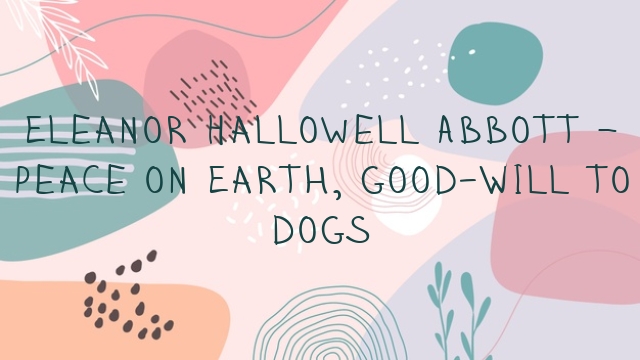
Eleanor Hallowell Abbott – Peace on Earth, Good-Will to Dogs
This is a long short story that was rather popular when published. It follows a young woman named Flame Nourice, a minister's daughter, who is excited to learn that someone is moving into a deserted house and volunteers to help.
PART I
If you don’t like Christmas stories, don’t read this one!
And if you don’t like dogs I don’t know just what to advise you to do!
For I warn you perfectly frankly that I am distinctly pro-dog and distinctly pro-Christmas, and would like to bring to this little story whatever whiff of fir-balsam I can cajole from the make-believe forest in my typewriter, and every glitter of tinsel, smudge of toy candle, crackle of wrapping paper, that my particular brand of brain and ink can conjure up on a single keyboard! And very large-sized dogs shall romp through every page! And the mercury shiver perpetually in the vicinity of zero! And every foot of earth be crusty-brown and bare with no white snow at all till the very last moment when you’d just about given up hope! And all the heart of the story is very,—oh very young!
For purposes of propriety and general historical authenticity there are of course parents in the story. And one or two other oldish persons. But they all go away just as early in the narrative as I can manage it.—Are obliged to go away!
Yet lest you find in this general combination of circumstances some sinister threat of audacity, let me conventionalize the story at once by opening it at that most conventional of all conventional Christmas-story hours,—the Twilight of Christmas Eve.
Nuff said?—Christmas Eve, you remember? Twilight? Awfully cold weather? And somebody very young?
Now for the story itself!
After five blustering, wintry weeks of village speculation and gossip there was of course considerable satisfaction in being the first to solve the mysterious holiday tenancy of the Rattle-Pane House.
Breathless with excitement Flame Nourice telephoned the news from the village post-office. From a pedestal of boxes fairly bulging with red-wheeled go-carts, one keen young elbow rammed for balance into a gay glassy shelf of stick-candy,[4] green tissue garlands tickling across her cheek, she sped the message to her mother.
“O Mother-Funny!” triumphed Flame. “I’ve found out who’s Christmasing at the Rattle-Pane House!—It’s a red-haired setter dog with one black ear! And he’s sitting at the front gate this moment! Superintending the unpacking of the furniture van! And I’ve named him Lopsy!”
“Why, Flame; how—absurd!” gasped her mother. In consideration of the fact that Flame’s mother had run all the way from the icy-footed chicken yard to answer the telephone it shows distinctly what stuff she was made of that she gasped nothing else.
And that Flame herself re-telephoned within the half hour to acknowledge her[5] absurdity shows equally distinctly what stuff she was made of! It was from the summit of a crate of holly-wreaths that she telephoned this time.
“Oh Mother-Funny,” apologized Flame, “you were perfectly right. No lone dog in the world could possibly manage a great spooky place like the Rattle-Pane House. There are two other dogs with him! A great long, narrow sofa-shaped dog upholstered in lemon and white,—something terribly ferocious like ‘Russian Wolf Hound’ I think he is! But I’ve named him Beautiful-Lovely! And there’s the neatest looking paper-white coach dog just perfectly ruined with ink-spots! Blunder-Blot, I think, will make a good name for him! And—”
“Oh—Fl—ame!” panted her Mother. “Dogs—do—not—take houses!” It was not from the chicken-yard that she had come running this time but only from her Husband’s Sermon-Writing-Room in the attic.
“Oh don’t they though?” gloated Flame. “Well, they’ve taken this one, anyway! Taken it by storm, I mean! Scratched all the green paint off the front door! Torn a hole big as a cavern in the Barberry Hedge! Pushed the sun-dial through a bulkhead!—If it snows to-night the cellar’ll be a Glacier! And—”
“Dogs—do—not—take—houses,” persisted Flame’s mother. She was still persisting it indeed when she returned to her husband’s study.
Her husband, it seemed, had not noticed her absence. Still poring over the tomes and commentaries incidental to the preparation of his next Sunday’s sermon his fine face glowed half frown, half ecstasy, in the December twilight, while close at his elbow all unnoticed a smoking kerosine lamp went smudging its acrid path to the ceiling. Dusky lock for dusky lock, dreamy eye for dreamy eye, smoking lamp for smoking lamp, it might have been a short-haired replica of Flame herself.
“Oh if Flame had only been ‘set’ like the maternal side of the house!” reasoned Flame’s Mother. “Or merely dreamy like her Father! Her Father being only dreamy could sometimes be diverted from his dreams! But to be ‘set’ and ‘dreamy’ both? Absolutely ‘set’ on being absolutely ‘dreamy’? That was Flame!” With renewed tenacity Flame’s Mother reverted to Truth as Truth. “Dogs do not take houses!” she affirmed with unmistakable emphasis.
“Eh? What?” jumped her husband. “Dogs? Dogs? Who said anything about dogs?” With a fretted pucker between his brows he bent to his work again. “You interrupted me,” he reproached her. “My sermon is about Hell-Fire.—I had all but smelled it.—It was very disagreeable.” With a gesture of impatience he snatched up his notes and tore them in two. “I think I will write about the Garden of Eden instead!” he rallied. “The Garden of Eden in Iris time! Florentina Alba everywhere! Whiteness! Sweetness!—Now let me see,—orris root I believe is deducted from the Florentina Alba—.”
“U—m—m—m,” sniffed Flame’s Mother. With an impulse purely practical she started for the kitchen. “The season happens to be Christmas time,” she suggested bluntly. “Now if you could see your way to make a sermon that smelt like doughnuts and plum-pudding—”
“Doughnuts?” queried her Husband and hurried after her. Supplementing the far, remote Glory-of-God expression in his face, the glory-of-doughnuts shone suddenly very warmly.
Flame at least did not have to be reminded about the Seasons.
“Oh mother!” telephoned Flame almost at once, “It’s—so much nearer Christmas than it was half an hour ago! Are you sure everything will keep? All those big packages that came yesterday? That humpy one especially? Don’t you think you ought to peep? Or poke? Just the teeniest, tiniest little peep or poke? It would be a shame if anything spoiled! A—turkey—or a—or a fur coat—or anything.”
“I am—making doughnuts,” confided her Mother with the faintest possible taint of asperity.
“O—h,” conceded Flame. “And Father’s watching them? Then I’ll hurry! M—Mother?” deprecated the excited young voice. “You are always so horridly right! Lopsy and Beautiful-Lovely and Blunder-Blot are not Christmasing all alone in the Rattle-Pane House! There is a man with them! Don’t tell Father,—he’s so nervous about men!”
“A—man?” stammered her Mother. “Oh I hope not a young man! Where did he come from?”
“Oh I don’t think he came at all,” confided Flame. It was Flame who was perplexed this time. “He looks to me more like a person who had always been there! Like something I mean that the dogs found in the attic! Quite crumpled he is! And with a red waistcoat!—A—A butler perhaps?—A—A sort of a second hand butler? Oh Mother!—I wish we had a butler!”
“Flame—?” interrupted her Mother quite abruptly. “Where are you doing all this telephoning from? I only gave you eighteen cents and it was to buy cereal with.”
“Cereal?” considered Flame. “Oh that’s all right,” she glowed suddenly. “I’ve paid cash for the telephoning and charged the cereal.”
With a swallow faintly guttural Flame’s Mother hung up the receiver. “Dogs—do—not—have—butlers,” she persisted unshakenly.
She was perfectly right. They did not, it seemed.
No one was quicker than Flame to acknowledge a mistake. Before five o’clock Flame had added a telephone item to the cereal bill.
“Oh—Mother,” questioned Flame. “The little red sweater and Tam that I have on?—Would they be all right, do you think, for me to make a call in? Not a formal call, of course,—just a—a neighborly greeting at the door? It being Christmas Eve and everything!—And as long as I have to pass right by the house anyway?—There is a lady at the Rattle-Pane House! A—A—what Father would call a Lady Maiden!—Miss—”
“Oh not a real lady, I think,” protested her Mother. “Not with all those dogs. No real lady I think would have so many dogs.—It—It isn’t sanitary.”
“Isn’t—sanitary?” cried Flame. “Why Mother, they are the most absolutely—perfectly sanitary dogs you ever saw in your life!” Into her eager young voice an expression of ineffable dignity shot suddenly. “Well—really, Mother,” she said, “In whatever concerns men or crocheting—I’m perfectly willing to take Father’s advice or yours. But after all, I’m eighteen,” stiffened the young voice. “And when it comes to dogs—I must use my own judgment!”
“And just what is the lady’s name?” questioned her Mother a bit weakly.
“Her name is ‘Miss Flora’!” brightened Flame. “The Butler has just gone to the Station to meet her! I heard him telephoning quite frenziedly! I think she must have missed her train or something! It seemed to make everybody very nervous! Maybe she’s nervous! Maybe she’s a nervous invalid! With a lost Lover somewhere! And all sorts of pressed flowers!—Somebody ought to call anyway! Call right away, I mean, before she gets any more nervous!—So many people’s first impressions of a place—I’ve heard—are spoiled for lack of some perfectly silly little thing like a nutmeg grater or a hot water bottle! And oh, Mother, it’s been so long since any one lived in the Rattle-Pane House! Not for years and years and years! Not dogs, anyway! Not a lemon and white wolf hound! Not setters! Not spotty dogs!—Oh Mother, just one little wee single minute at the door? Just long enough to say ‘The Rev. and Mrs. Flamande Nourice, and Miss Nourice, present their compliments!’—And are you by any chance short a marrow-bone? Or would you possibly care to borrow an extra quilt to rug-up under the kitchen table?… Blunder-Blot doesn’t look very thick. Or—Oh Mother, p-l-e-a-s-e!”
When Flame said “Please” like that the word was no more, no less, than the fabled bundle of rags or haunch of venison hurled back from a wolf-pursued sleigh to divert the pursuer even temporarily from the main issue. While Flame’s Mother paused to consider the particularly flavorous sweetness of that entreaty,—to picture the flashing eye, the pulsing throat, the absurdly crinkled nostril that invariably accompanied all Flame’s entreaties, Flame herself was escaping!
Taken all in all, escaping was one of the best things that Flame did…. As well as the most becoming! Whipped into scarlet by the sudden plunge from a stove-heated store into the frosty night her young cheeks fairly blazed their bright reaction. Frost and speed quickened her breath. Glint for glint her shining eyes challenged the moon. Fearful even yet that some tardy admonition might overtake her she sped like a deer through the darkness.
It was a dull-smelling night. Pretty, but very dull-smelling. Disdainfully her nostrils crinkled their disappointment.
“Christmas Time adventures ought to smell like Christmas!” she scolded. “Maybe if I’m ever President,” she argued, “I won’t do so awfully well with the Tariff or things like that! But Christmas shall smell of Christmas! Not just of frozen mud! And camphor balls!… I’ll have great vats of Fir Balsam essence at every street corner! And gigantic atomizers! And every passerby shall be sprayed! And stores! And churches! And—And everybody who doesn’t like Christmas shall be dipped!”
Under her feet the smoothish village road turned suddenly into the harsh and hobbly ruts of a country lane. With fluctuant blackness against immutable blackness great sweeping pine trees swished weirdly into the horizon. Where the hobbly lane curved darkly into a meadow through a snarl of winter-stricken willows the rattle of a loose window-pane smote quite distinctly on the ear. It was a horrid, deserted sound. And with the instinctive habit of years Flame’s little hand clutched at her heart. Then quite abruptly she laughed aloud.
“Oh you can’t scare me any more, you gloomy old Rattle-Pane House!” she laughed. “You’re not deserted now! People are Christmasing in you! Whether you like it or not you’re being Christmased!”
Very tentatively she puckered her lips to a whistle. Almost instantly from the darkness ahead a dog’s bark rang out, deep, sonorous, faintly suspicious. With a little chuckle of joy she crawled through the Barberry hedge and emerged for a single instant only at her full height before three furry shapes came hurtling out of the darkness and toppled her over backwards.
“Stop, Beautiful-Lovely!” she gasped. “Stop, Lopsy! Behave yourself, Blunder-Blot! Sillies! Don’t you know I’m the lady that was talking to you this morning through the picket fence? Don’t you know I’m the lady that fed you the box of cereal?—Oh dear—Oh dear—Oh dear,” she struggled. “I knew, of course, that there were three dogs—but who ever in the world would have guessed that three could be so many?”
As expeditiously as possible she picked herself up and bolted for the house with two furry shapes leaping largely on either side of her and one cold nose sniffing interrogatively at her heels. Her heart was very light,—her pulses jumping with excitement,—an occasional furry head doming into the palm of her hand warmed the whole bleak night with its sense of mute companionship. But the back of her heels felt certainly very queer. Even the warm yellow lights of the Rattle-Pane House did not altogether dispel her uneasiness.
“Maybe I’d better not plan to make my call so—so very informal,” she decided suddenly. “Not at a house where there are quite so many dogs! Not at a house where there is a butler … anyway!”
Crowding and pushing and yelping and fawning around her, it was the dogs who announced her ultimate arrival. Like a drift of snow the huge wolf-hound whirled his white shagginess into the vestibule. Shrill as a banging blind the impetuous coach-dog lurched his sleek weight against the door. Sucking at a crack of light the red setter’s kindled nose glowed and snorted with dragonlike ferocity. Without knock or ring the door-handle creaked and turned, three ecstatic shapes went hurtling through a yellow glare into the hall beyond, and Flame found herself staring up into the blinking, astonished eyes of the crumpled old man with the red waistcoat.
“G—Good evening,—Butler!” she rallied.
“Good evening, Miss!” stammered the Butler.
“I’ve—I’ve come to call,” confided Flame.
“To—call?” stammered the Butler.
“Yes,” conceded Flame. “I—I don’t happen to have an engraved card with me.” Before the continued imperturbability of the old Butler all subterfuge seemed suddenly quite useless. “I never have had an engraved card,” she confided quite abruptly. “But you might tell Miss Flora if you please—” … Would nothing crack the Butler’s imperturbability?… Well maybe she could prove just a little bit imperturbable herself! “Oh! Butlers don’t ‘tell’ people things, do they?… They always ‘announce’ things, don’t they?… Well, kindly announce to Miss Flora that the—the Minister’s Daughter is—at the door!… Oh, no! It isn’t asking for a subscription or anything!” she hastened quite suddenly to explain. “It’s just a Christian call!… B—Being so nervous and lost on the train and everything … we thought Miss Flora might be glad to know that there were neighbors…. We live so near and everything…. And can run like the wind! Oh, not Mother, of course!… She’s a bit stout! And Father starts all right but usually gets thinking of something else! But I…? Kindly announce to Miss Flora,” she repeated with palpable crispness, “that the Minister’s Daughter is at the door!”
Fixedly old, fixedly crumpled, fixedly imperturbable, the Butler stepped back a single jerky pace and bowed her towards the parlor.
“Now,” thrilled Flame, “the adventure really begins.”
It certainly was a sad and romantic looking parlor, and strangely furnished, Flame thought, for even “moving times.” Through a maze of bulging packing boxes and barrels she picked her way to a faded rose-colored chair that flanked the fire-place. That the chair was already half occupied by a pile of ancient books and four dusty garden trowels only served to intensify the general air of gloom. Presiding over all, two dreadful bouquets of long-dead grasses flared wanly on the mantle-piece. And from the tattered old landscape paper on the walls Civil War heroes stared regretfully down through pale and tarnished frames.
“Dear me … dear me,” shivered Flame. “They’re not going to Christmas at all … evidently! Not a sprig of holly anywhere! Not a ravel of tinsel! Not a jingle bell!… Oh she must have lost a lot of lovers,” thrilled Flame. “I can bring her flowers, anyway! My very first Paper White Narcissus! My—.”With a scrape of the foot the Butler made known his return.
“Miss Flora!” he announced.
With a catch of her breath Flame jumped to her feet and turned to greet the biggest, ugliest, most brindled, most wizened Bull Dog she had ever seen in her life.
“Miss Flora!” repeated the old Butler succinctly.
“Miss Flora?” gasped Flame. “Why…. Why, I thought Miss Flora was a Lady! Why—”
“Miss Flora is indeed a very grand lady, Miss!” affirmed the Butler without a flicker of expression. “Of a pedigree so famous … so distinguished … so …” Numerically on his fingers he began to count the distinctions. “Five prizes this year! And three last! Do you mind the chop?” he gloated. “The breadth! The depth!… Did you never hear of alauntes?” he demanded. “Them bull-baiting dogs that was invented by the second Duke of York or thereabouts in the year 1406?”
“Oh my Glory!” thrilled Flame. “Is Miss Flora as old as that?”
“Miss Flora,” said the old Butler with some dignity, “is young—hardly two in fact—so young that she seems to me but just weaned.”
With her great eyes goggled to a particularly disconcerting sort of scrutiny Miss Flora sprang suddenly forward to investigate the visitor.
As though by a preconcerted signal a chair crashed over in the hall and the wolf hound and the setter and the coach dog came hurtling back in a furiously cordial onslaught. With wags and growls and yelps of joy all four dogs met in Flame’s lap.
“They seem to like me, don’t they?” triumphed Flame. Intermittently through the melee of flapping ears,—shoving shoulders,—waving paws, her beaming little face proved the absolute sincerity of that triumph. “Mother’s never let me have any dogs,” she confided. “Mother thinks they’re not—Oh, of course, I realize that four dogs is a—a good many,” she hastened diplomatically to concede to a certain sudden droop around the old Butler’s mouth corners.
From his slow, stooping poke of the sulky fire the old Butler glanced up with a certain plaintive intentness.
“All dogs is too many,” he affirmed.”Come Christmas time I wishes I was dead.”
“Wish you were dead … at Christmas Time?” cried Flame. Acute shock was in her protest.
“It’s the feedin’,” sighed the old Butler. “It ain’t that I mind eatin’ with them on All Saints’ Day or Fourth of July or even Sundays. But come Christmas Time it seems like I craves to eat with More Humans…. I got a nephew less’n twenty miles away. He’s got cider in his cellar. And plum puddings. His woman she raises guinea chickens. And mince pies there is. And tasty gravies.—But me I mixes dog bread and milk—dog bread and milk—till I can’t see nothing—think nothing but mush. And him with cider in his cellar!… It ain’t as though Mr. Delcote ever came himself to prove any[29]thing,” he argued. “Not he! Not Christmas Time! It’s travelling he is…. He’s had … misfortunes,” he confided darkly. “He travels for ‘em same as some folks travels for their healths. Most especially at Christmas Time he travels for his misfortunes! He …”
“Mr. Delcote?” quickened Flame. “Mr. Delcote?” (Now at last was the mysterious tenancy about to be divulged?)
“All he says,” persisted the old Butler. “All he says is ‘Now Barret,’—that’s me, ‘Now Barret I trust your honor to see that the dogs ain’t neglected just because it’s Christmas. There ain’t no reason, Barret’, he says, ‘why innocent dogs should suffer Christmas just because everybody else does. They ain’t done nothing…. It won’t do now Barret’, he says, ‘for you to give ‘em their dinner at dawn when they ain’t accustomed to it, and a pail of water, and shut ‘em up while you go off for the day with any barrel of cider. You know what dogs is, Barret’, he says. ‘And what they isn’t. They’ve got to be fed regular’, he says, ‘and with discipline. Else there’s deaths.—Some natural. Some unnatural. And some just plain spectacular from furniture falling on their arguments. So if there’s any fatalities come this Christmas Time, Barret’, he says, ‘or any undue gains in weight or losses in weight, I shall infer, Barret’, he says, ‘that you was absent without leave.’ … It don’t look like a very wholesome Christmas for me,” sighed the old Butler. “Not either way. Not what you’d call wholesome.”
“But this Mr. Delcote?” puzzled Flame. “What a perfectly horrid man he must be to give such heavenly dogs nothing but dog-bread and milk for their Christmas dinner!… Is he young? Is he old? Is he thin? Is he fat? However in the world did he happen to come to a queer, battered old place like the Rattle-Pane House? But once come why didn’t he stay? And—And—And—?”
“Yes’m,” sighed the old Butler.
In a ferment of curiosity, Flame edged jerkily forward, and subsided as jerkily again.
“Oh, if this only was a Parish Call,” she deprecated, “I could ask questions right out loud. ‘How? Where? Why? When?’ … But being just a social call—I suppose—I suppose…?” Appealingly her eager eyes searched the old Butler’s inscrutable face.
“Yes’m,” repeated the old Butler dully. Through the quavering fingers that he swept suddenly across his brow two very genuine tears glistened.
With characteristic precipitousness Flame jumped to her feet.
“Oh, darn Mr. Delcote!” she cried. “I’ll feed your dogs, Christmas Day! It won’t take a minute after my own dinner or before! I’ll run like the wind! No one need ever know!”
So it was that when Flame arrived at her own home fifteen minutes later, and found her parents madly engaged in packing suit-cases, searching time-tables, and rushing generally to and fro from attic to cellar, no very mutual exchange of confidences ensued.
“It’s your Uncle Wally!” panted her Mother.
“Another shock!” confided her Father.”Not such a bad one, either,” explained her Mother. “But of course we’ll have to go! The very first thing in the morning! Christmas Day, too! And leave you all alone! It’s a perfect shame! But I’ve planned it all out for everybody! Father’s Lay Reader, of course, will take the Christmas service! We’ll just have to omit the Christmas Tree surprise for the children!… It’s lucky we didn’t even unpack the trimmings! Or tell a soul about it.” In a hectic effort to pack both a thick coat and a thin coat and a thick dress and a thin dress and thick boots and thin boots in the same suit-case she began very palpably to pant again. “Yes! Every detail is all planned out!” she asserted with a breathy sort of pride. “You and your Father are both so flighty I don’t know whatever in the world you’d do if I didn’t plan out everything for you!”
With more manners than efficiency Flame and her Father dropped at once every helpful thing they were doing and sat down in rocking chairs to listen to the plan.
“Flame, of course, can’t stay here all alone. Flame’s Mother turned and confided sotto voce to her husband. Young men might call. The Lay Reader is almost sure to call…. He’s a dear delightful soul of course, but I’m afraid he has an amorous eye.”
“All Lay Readers have amorous eyes,” reflected her husband. “Taken all in all it is a great asset.”
“Don’t be flippant!” admonished Flame’s Mother. “There are reasons … why I prefer that Flame’s first offer of marriage should not be from a Lay Reader.”
“Why?” brightened Flame.
“S—sh—,” cautioned her Father.
“Very good reasons,” repeated her Mother. From the conglomerate packing under her hand a puff of spilled tooth-powder whiffed fragrantly into the air.
“Yes?” prodded her husband’s blandly impatient voice.
“Flame shall go to her Aunt Minna’s” announced the dominant maternal voice. “By driving with us to the station, she’ll have only two hours to wait for her train, and that will save one bus fare! Aunt Minna is a vegetarian and doesn’t believe in sweets either, so that will be quite a unique and profitable experience for Flame to add to her general culinary education! It’s a wonderful house!… A bit dark of course! But if the day should prove at all bright,—not so bright of course that Aunt Minna wouldn’t be willing to have the shades up, but—Oh and Flame,” she admonished still breathlessly, “I think you’d better be careful to wear one of your rather longish skirts! And oh do be sure to wipe your feet every time you come in! And don’t chatter! Whatever you do, don’t chatter! Your Aunt Minna, you know, is just a little bit peculiar! But such a worthy woman! So methodical! So….”
To Flame’s inner vision appeared quite suddenly the pale, inscrutable face of the old Butler who asked nothing,—answered nothing,—welcomed nothing,—evaded nothing.”… Yes’m,” said Flame.
But it was a very frankly disconsolate little girl who stole late that night to her Father’s study, and perched herself high on the arm of his chair with her cheek snuggled close to his.
“Of Father-Funny,” whispered Flame, “I’ve got such a queer little pain.”
“A pain?” jerked her Father. “Oh dear me! Where is it? Go and find your Mother at once!”
“Mother?” frowned Flame. “Oh it isn’t that kind of a pain.—It’s in my Christmas. I’ve got such a sad little pain in my Christmas.”
“Oh dear me—dear me!” sighed her Father. Like two people most precipitously smitten with shyness they sat for a moment staring blankly around the room at every conceivable object except each other. Then quite suddenly they looked back at each other and smiled.
“Father,” said Flame. “You’re not of course a very old man…. But still you are pretty old, aren’t you? You’ve seen a whole lot of Christmasses, I mean?”
“Yes,” conceded her Father.
From the great clumsy rolling collar of her blanket wrapper Flame’s little face loomed suddenly very pink and earnest.
“But Father,” urged Flame. “Did you ever in your whole life spend a Christmas just exactly the way you wanted to? Honest-to-Santa Claus now,—did you ever?”
“Why—Why, no,” admitted her Father after a second’s hesitation. “Why no, I don’t believe I ever did.” Quite frankly between his brows there puckered”I agree with you … utterly, Father-Funny!” said Flame. “But … Father,” she persisted, “Of all the people you know in the world,—millions would it be?”
“No, call it thousands” corrected her Father.
“Well, thousands,” accepted Flame. “Old people, young people, fat people, skinnys, cross people, jolly people?… Did you ever in your life know any one who had ever spent Christmas just the way he wanted to?”
“Why … no, I don’t know that I ever did,” considered her Father. With his elbows on the arms of his chair, his slender fingers forked to a lovely Gothic arch above the bridge of his nose, he yielded himself instantly to the reflection. “Why … no, … I don’t know that I ever did,” he repeated with an increasing air of conviction…. “When you’re young enough to enjoy the day as a ‘holler’ day there’s usually some blighting person who prefers to have it observed as a holy day…. And by the time you reach an age where you really rather appreciate its being a holy day the chances are that you’ve got a houseful of racketty youngsters who fairly insist on reverting to the ‘holler’ day idea again.”
“U—m—m,” encouraged Flame.
—”When you’re little, of course,” mused her Father, “you have to spend the day the way your elders want you to!… You crave a Christmas Tree but they prefer stockings! You yearn to skate but they consider the weather better for corn-popping! You ask for a bicycle but they had already found a very nice bargain in flannels! You beg to dine the gay-kerchiefed Scissor-Grinder’s child, but they invite the Minister’s toothless mother-in-law!… And when you’re old enough to go courting,” he sighed, “your lady-love’s sentiments are outraged if you don’t spend the day with her and your own family are perfectly furious if you don’t spend the day with them!… And after you’re married?” With a gesture of ultimate despair he sank back into his cushions. “N—o, no one, I suppose, in the whole world, has ever spent Christmas just exactly the way he wanted to!”
“Well, I,” triumphed Flame, “have got a chance to spend Christmas just exactly the way I want to!… The one chance perhaps in a life-time, it would seem!…With a crisp flutter of skirts Flame’s Mother, herself, appeared abruptly in the door. Her manner was very excited.
“Why wherever in the world have you people been?” she cried. “Are you stone deaf? Didn’t you hear the telephone? Couldn’t you even hear me calling? Your Uncle Wally is worse! That is he’s better but he thinks he’s worse! And they want us to come at once! It’s something about a new will! The Lawyer telephoned! He advises us to come at once! They’ve sent an automobile for us! It will be here any minute!… But whatever in the world shall we do about Flame?” she cried distractedly. “You know how Uncle Wally feels about having young people in the house! And she can’t possibly go to Aunt Minna’s till to-morrow! And….””But you see I’m not going to Aunt Minna’s!” announced Flame quite serenely. Slipping down from her Father’s lap she stood with a round, roly-poly flannel sort of dignity confronting both her parents. “Father says I don’t have to!”
“Why, Flame!” protested her Father.
“No, of course, you didn’t say it with your mouth,” admitted Flame. “But you said it with your skin and bones!—I could feel it working.”
“Not go to your Aunt Minna’s?” gasped her Mother. “What do you want to do?… Stay at home and spend Christmas with the Lay Reader?”
“When you and Father talk like that,” murmured Flame with some hauteur, “I don’t know whether you’re trying to run him down … or run him up.””Well, how do you feel about him yourself?” veered her Father quite irrelevantly.
“Oh, I like him—some,” conceded Flame. In her bright cheeks suddenly an even brighter color glowed. “I like him when he leaves out the Litany,” she said. “I’ve told him I like him when he leaves out the Litany.—He’s leaving it out more and more I notice.—Yes, I like him very much.”
“But this Aunt Minna business,” veered back her Father suddenly. “What do you want to do? That’s just the question. What do you want to do?”
“Yes, what do you want to do?” panted her Mother.
“I want to make a Christmas for myself!” said Flame. “Oh, of course, I know perfectly well,” she agreed, “that I could go to a dozen places in the Parish and be cry-babied over for my presumable loneliness. And probably I should cry a little,” she wavered, “towards the dessert—when the plum pudding came in and it wasn’t like Mother’s.—But if I made a Christmas of my own—” she rallied instantly. “Everything about it would be brand-new and unassociated! I tell you I want to make a Christmas of my own! It’s the chance of a life-time! Even Father sees that it’s the chance of a life-time!”
“Do you?” demanded his wife a bit pointedly.
“Honk-honk!” screamed the motor at the door.
“Oh, dear me, whatever in the world shall I do?” cried Flame’s Mother. “I’m almost distracted! I’m—””When in Doubt do as the Doubters do,” suggested Flame’s Father quite genially. “Choose the most doubtful doubt on the docket and—Flame’s got a pretty level head,” he interrupted himself very characteristically.
“No young girl has a level heart,” asserted Flame’s Mother. “I’m so worried about the Lay Reader.”
“Lay Reader?” murmured her Father. Already he had crossed the threshold into the hall and was rummaging through an over-loaded hat rack for his fur coat. “Why, yes,” he called back, “I quite forgot to ask. Just what kind of a Christmas is it, Flame, that you want to make?” With unprecedented accuracy he turned at the moment to force his wife’s arms into the sleeves of her own fur coat.
Twice Flame rolled up her cuffs and[50] rolled them down again before she answered.
“I—I want to make a Surprise for Miss Flora,” she confided.
“Honk-honk!” urged the automobile.
“For Miss Flora?” gasped her Mother.
“Miss Flora?” echoed her Father.
“Why, at the Rattle-Pane House, you know!” rallied Flame. “Don’t you remember that I called there this afternoon? It—it looked rather lonely there.—I—think I could fix it.”
“Honk-honk-honk!” implored the automobile.
“But who is this Miss Flora?” cried her Mother. “I never heard anything so ridiculous in my life! How do we know she’s respectable?”
“Oh, my dear,” deprecated Flame’s[51] Father. “Just as though the owners of the Rattle-Pane House would rent it to any one who wasn’t respectable!”
“Oh, she’s very respectable,” insisted Flame. “Of a lineage so distinguished—”
“How old might this paragon be?” queried her Father.
“Old?” puzzled Flame. To her startled mind two answers only presented themselves…. Should she say “Oh, she’s only just weaned,” or “Well,—she was invented about 1406?” Between these two dilemmas a single compromise suggested itself. “She’s awfully wrinkled,” said Flame; “that is—her face is. All wizened up, I mean.”
“Oh, then of course she must be respectable,” twinkled Flame’s Father.
“And is related in some way,” persisted Flame, “to Edward the 2nd—Duke of York.”
“Of that guarantee of respectability I am, of course, not quite so sure,” said her Father.
With a temperish stamping of feet, an infuriate yank of the door-bell, Uncle Wally’s chauffeur announced that the limit of his endurance had been reached.
Blankly Flame’s Mother stared at Flame’s Father. Blankly Flame’s Father returned the stare.
“Oh, p-l-e-a-s-e!” implored Flame. Her face was crinkled like fine crêpe.
“Smooth out your nose!” ordered her Mother. On the verge of capitulation the same familiar fear assailed her. “Will you promise not to see the Lay Reader?” she bargained.
“—Yes’m,” said Flame.





